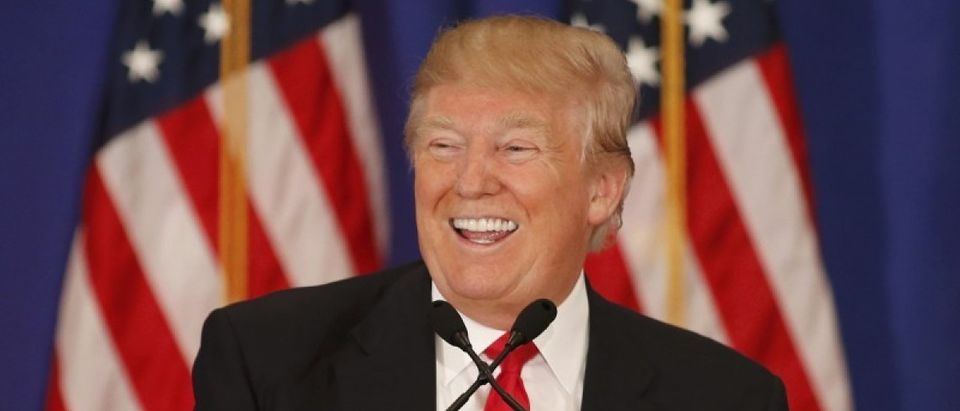Donald Trump loves a deal. Of course, he prefers a good deal. But he’s also made plenty of bad ones in his long and prolific career (law of averages, I guess). So if we’re going to subscribe to the Monty Hall doctrine of foreign policy, it might be time to ask whether a default setting that favors deal-making is in America’s or our allies’ best interests.
Though Trump has repeatedly promised to produce a list of foreign policy advisors (the latest promise was broken two weeks ago) and acknowledged in last week’s debate that he “likes” Council on Foreign Relations head Richard Haass and Fox News National Security Analyst retired General Jack Keane, no list has been forthcoming. So voters still have no idea who, if anyone, is advising him. Meanwhile, his pronouncements on foreign policy alternate between bellicose (“bomb the s**t out of them”) and pacifist (“we cannot continue to be the policeman of the world”), but never detailed. As an ideologically diverse group of GOP national security experts wrote in an open letter published last week, “he swings from isolationism to military adventurism within the space of one sentence.”
Trump’s application to politics of his proclivity for deal-making is a frequent topic. For example, see here, where the future Dealmaker in Chief will let you in on such profound insights as “when you’re dealing with Russia, it may be different than dealing with China.” But is pushing for a deal always a good idea?
Nowhere are the potential pitfalls of the Dealmaker’s mindset more manifest than in the ongoing conflict between Israel and the Palestinians. On this issue, Trump has been clear and consistent and dangerously wrong. In a December interview with the Associated Press, Trump seemed to suggest that the reason for the continuation of the conflict was a question of “Israel’s willing[ness] to sacrifice certain things.”
In the pre-Super Tuesday Republican debate, most people who pay attention to foreign policy focused on Trump’s interest in remaining “neutral” in the ongoing conflict between our long-term, democratic ally and the murderous, nihilistic irredentists seeking to destroy them. Lost in the preoccupation with Trump’s “neutrality” was his admission that, “as president, however, there’s nothing that I would rather do [than] to bring peace to Israel and its neighbors generally.”
It wasn’t the first time Trump has spoken of his itch for more handshaking on the White House lawn. On February 17, Trump sat down with MSNBC’s “Morning Joe” hosts Joe Scarborough and Mika Brzezinksi and shared his thoughts on the Israeli-Palestinian conflict:
But of all agreements, I always said if you can do that deal, you can do any deal. But that’s probably the toughest deal in the world right now to make. And, it’s possible it’s not makeable because, don’t forget, it has to last. You know, it’s wonderful to make it and it doesn’t work. But it has to last. To make lasting peace there – probably the toughest deal of all. But I’m gonna give it a shot … it would be so great. I would be so proud if I could do that.”
No doubt about it – Donald Trump loves a deal.
Unfortunately, in the Israeli-Palestinian conflict, there is no deal to be had right now. While the Israelis have repeatedly demonstrated a willingness to make painful concessions for peace, their good faith has always been met by violence. As daily stabbing and car-ramming attacks (many of them perpetrated by children) against innocent Israelis continue, even the official Israeli political opposition has come to the conclusion that the current Palestinian leadership is not serious about building a state. Polling indicates that Palestinians overwhelmingly favor violence against Israelis.
Deal-making – especially when futile – can bog down an administration, detract from other important international issues, and diminish the prestige and power of the United States. And making deals that don’t last isn’t something to shrug our shoulders at (as Trump does in the quote above). There is always a body count associated with failed negotiations.
And, yet, this is all Trump knows. He is an inveterate dealmaker. When he encounters an obstacle in his path to a deal – for example, Israeli security concerns, or silly, ancient religious beliefs that he doesn’t understand – he will plow forward, undeterred. As of now, he seems to have no team of foreign policy advisors with whom he has working relationships and a reserve supply of earned trust – a team that could tell him when his instincts are serving him poorly.
There is only one way to create the circumstances for a peaceful solution to the conflict: make clear that the West will unequivocally support Israel and apply substantial economic and diplomatic pressure on the Palestinians to reform their institutions and meaningfully prepare themselves and their people for independence. This requires the firm, consistent application of principle. It does not require a deal. And it’s why Donald Trump’s skill set seems remarkably mismatched to the situation. Pro-Israel Americans – indeed, any American who values our position of leadership in the world – should be wary.
Jonathan Greenberg is an ordained Reform rabbi and the senior vice president of the Haym Salomon Center. A former staffer at the American Israel Public Affairs Committee, you can follow him @JGreenbergSez.












